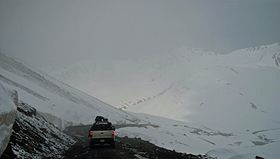| Burzil Pass | |
|---|---|
 Part of the route through the Burzil Pass in Pakistani-administered Kashmir | |
| Elevation | 4,100 m (13,451 ft)[2] |
| Length | 46 miles (74 km) |
| Location | Gilgit−Baltistan, Pakistan |
| Range | Himalayas |
| Coordinates | 34°54′00″N 75°06′00″E / 34.90000°N 75.10000°E[1] |
Location in Gilgit−Baltistan | |
 | |
The Burzil Pass (el. 4,100 m (13,500 ft))[3] (Urdu: درہ برزیل) is a mountain pass in northern Pakistan, and is part of the historic caravan route between the cities of Srinagar and Gilgit. The pass lies approximately 5 kilometres (3.1 mi) north of the administrative line between the Pakistani-administered territories of Gilgit−Baltistan and Azad Jammu and Kashmir, and some 30 kilometres (19 mi) north of the Line of Control (LoC), which serves as the de facto border between Pakistan and India in the disputed region of Kashmir. While the Burzil route ran freely through Jammu and Kashmir during British rule in India, major sections were largely closed off by Pakistan following the First Kashmir War, which saw the division by a ceasefire line of the former princely state and the start of an ongoing territorial conflict over the region. The crest of the pass is wide and covered with lush alpine grass vegetation during the summer. The Astore River originates from the western slopes of the Burzil Pass.[4]
It is the oldest-known route connecting Gilgit with Skardu and Srinagar through the Deosai Plateau. Ancient travellers are believed to have extensively crossed the pass by horse. At the beginning of the 20th century, a hut was built on the crest of the pass, where couriers delivered mail and messages from British India to China.[5]
The city of Gilgit is located some 367 kilometres (228 mi)[3] from Srinagar by road via the Burzil Pass above the northern banks of Wular Lake and Gurez in the Indian-administered territory of Jammu and Kashmir.[6]
- ^ GeoNames.org. "Burzil Pass".
- ^ "Burzil Pass, a hairpinned climb in Pakistan". www.dangerousroads.org. Retrieved 10 September 2020.
- ^ a b Imperial Gazetteer of India. Provincial Series: Kashmir and Jammu (facsimile reprint). Adamant Media Corporation (original: Superintendent of Government Printing, Calcutta). 4 July 2001 [1909]. p. 8. ISBN 978-0-543-91776-8. Retrieved 10 August 2009.
- ^ Sultana, K.; Muqarrab Shah; T.M.Upson (2007). "Altitudinal Distribution of Grasses, Sedges and Rushes of Deosai Plateau: Pakistan". The Electronic Journal of Environmental, Agricultural and Food Chemistry. 6 (11): 2518. ISSN 1579-4377. Archived from the original on 18 December 2009. Retrieved 11 August 2009.
- ^ "The Western Regions according to the Hou Hanshu, Chapter on the Western Regions from Hou Hanshu 88, The Kingdom of Wuyishanli 烏弋山離 (Kandahar, including Arachosia and Drangiana), 2nd ed". John Hill (translation, notes, appendices). September 2003.
{{cite web}}: CS1 maint: others (link) - ^ Bamzai, P. N. K. (1994). Culture and political history of Kashmir. Vol. 1. Ancient Kashmir. M D Publications. p. 9. ISBN 978-81-85880-31-0. Retrieved 10 August 2009.
